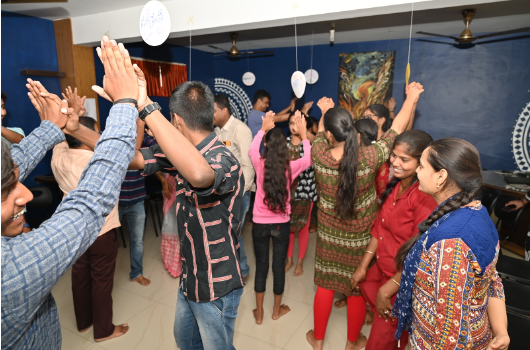This National Teacher’s Day, we remember our mentors who believed in us, long before we believed in ourselves. In school, while most teachers supported and appreciated only those who got high scores and ranks, we were lucky to have found teachers who did not ignore us and became facilitators to our self-awareness and growth. Growing up, teachers were mostly strict, not interacting with us as we were neither expressive nor excellent in studies, but thankfully we also had a few teachers who showed us the true meaning of learning. Education which encouraged us to be the best version of ourselves, as they spent their time understanding us- encouraging us to make right decisions, gently nudging us out of our comfort zones while recognising our skills and passions. They inspired us to be empathetic facilitators of learning for other young people at the Dream a Dream Thriving Centre for 15- 22 year olds, to help them make a healthy transition from adolescence to adulthood through life skill development programmes.
Recently, a young person reluctantly came to the centre at the insistence of a friend. He had decided to attend only one life skills session and seemed disinterested. To create a safe space for him and noticing his deep interest in playing chess, we decided to have a chess match. It was the first time he found a challenge that intrigued him. During our conversations, he confided his struggle to manage his emotions to the point of even contemplating suicide. This alerted us that he needed support. Even when he lost the first chess match, he didn’t give up. He kept practising and kept coming back to play. Over time, he attended sessions daily, primarily to play chess and win matches. He began to reflect on himself and the challenges he was facing, realising that his biggest struggle was connecting with his father, who was always very busy. He wanted to share his feelings with him and the growing gap between them was taking a toll on his emotional well-being. While sharing his challenges, he acknowledged that he needed to have an open and honest conversation. Once his feelings were validated, he went home and shared his feelings with his father, who reciprocated and the heartfelt conversation brought them closer and provided the young person tremendous relief. Social-emotional support can help quicken the process of academic skills development, improve career readiness, healthy relationships and also improve mental health for life. Within the thriving of every young person lies the true purpose of education.
As facilitators, we create free, non-judgemental space for everyone to explore and participate. Life skills activities make young people overcome their inhibitions to participate and express themselves. To be a role model for young people, we have to start by connecting with them and understanding their stories. Facilitation makes us reflect within ourselves to recognise the bias and prejudices we hold and to be mindful of systems suppressing the thriving potential of our young people by perpetuating these biases. When young people share their problems and life stories in the hope that we will help them reflect, motivate and guide them; they wish the same from teachers in their schools.
In the digital age where information is available at the tap of our finger-tips, teachers must redefine the teacher-student relationship. It can start with spending time with students to understand them, their difficulties or challenges in the class, by treating all students equally and encouraging students who are slow learners or less confident. Teachers as facilitators try to understand why young people are not learning, validate their lived experiences, connect with them and enable support systems around them to help them thrive. When we focus only on syllabus completion and judge one’s ability on the basis of marks scored or financial status, discriminating between students, labelling them as weak/ poor in studies/ good for nothing, they lose their confidence and start putting themselves down. Students who are not good at studies often have a different potential and if teachers give time to understand them and be friendly with them, all students can thrive. When teaching is simpler, made more interactive with experiential activities young people can connect more through their own stories and life experiences. Instead of punishing students in the class for their mistakes, making them reflect on their experiences and guiding them in a good way will help them to control negative emotions and reflect on the consequences of their behaviour.
Teachers as facilitators will not hold onto a rigid curriculum, but would be a guiding compass, to help students navigate the sea of knowledge. They will instil not just knowledge but skills to lead life such as critical thinking, collaboration and adaptability. Facilitators create a safe space for curiosity and exploration. Rather than a bestower of facts, they ignite the spark of inquiry, nudging students to seek answers, analyse and synthesise information independently, empowering students to take charge of their learning, fostering a sense of responsibility and self-direction. By setting goals, monitoring progress and helping young people make choices, they enable students to discover the joy of learning. Teachers as facilitators can bring out the best in young people on their journey to become future role models and changemakers.
About the Authors:
Ameera is a Programme Facilitator in Dream A Dream. Being a facilitator connects with her personally and is her passion.
Venkatesh is a dedicated Facilitator at the Dream a Dream Thriving Centre. His passion for working with young people and his unwavering compassion brings him immense joy.


